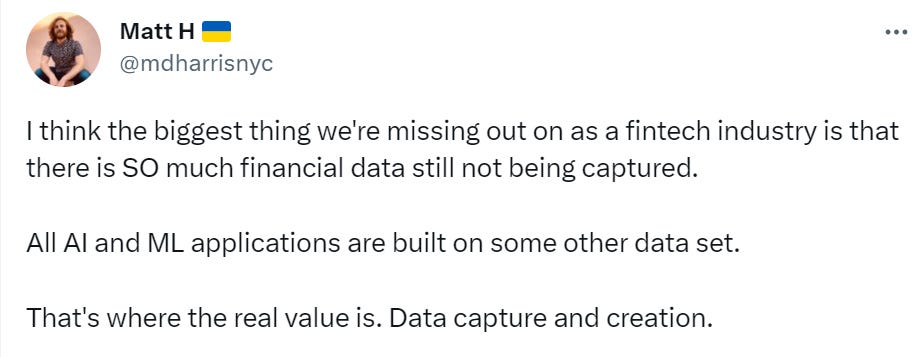Financial inclusion has a scale problem
Bridging the gap between research, advocacy, experimentation and large scale impact

Quick life update: I haven’t published a newsletter in months because I was job hunting.
August of last year, I left my role as Communications and Advocacy Manager at SIDFS and spent a few months resting, networking. And then entered a very wonky job market.
Last month I officially joined the Consultative Group on International Agricultural Research (CGIAR) as a communications consultant! If you’d told me in 2016 when I began my communications career that I’d be leading public relations and advocacy for international climate change efforts, I’d have recommended you see a shrink. But here we are.
I’ve settled in nicely at work and so I hope to resume my monthly publication schedule.
Over the coming months, the newsletter will expand beyond financial inclusion in Nigeria to also cover interesting stories about how climate change is affecting Africans.
And so with that, on to today’s newsletter!
======================================
Late last year, I had an interesting conversation with a friend about financial inclusion progress in developing countries.
While we both agreed that measuring bank accounts is a flawed metric for financial inclusion, he believed that development organisations (like the International Finance Corporation (IFC), Bill & Melinda Gates Foundation, Consultative Group to Assist the Poor (CGAP) etc.) are not the best actors to lead financial inclusion efforts, especially in Nigeria.
And I understand the sentiment - since 2014 Nigeria’s progress has plateaued as the number of excluded people has remained virtually the same. When compared with the amount of funding these development organisations (dev orgs) have received, it seems like they’re underperforming.
He also raised other criticisms - dev orgs are often under pressure to raise more funding which compels them to prioritise short-term outcomes and quick wins to justify requesting more funding. The fragmented nature of dev orgs and their competing priorities also leads to inefficiencies and duplicated efforts, etc.
But after over 5 years working on financial inclusion, permit me to disagree.
The issue is not that development organisations are ineffective but rather their efforts have been hard to scale.
Driving sustainable financial inclusion
Since the launch of the first National Financial Inclusion Strategy in 2012, significant reforms have been made by the CBN to transform the banking industry to make it more enabling for innovation. Over the last decade, we’ve witnessed the advent of instant transfers, USSD and mobile money, agency banking, 3-tiered KYC, Payment Service Banks, a fintech boom etc. all outcomes of reformed policies.
Development actors have then built holistic financial solutions on these innovations through controlled experiments in different communities.
For example, the Advancing Local Dairy Development in Nigeria (ALDDN) project which I wrote about last year is an impressive initiative that leverages agency banking, payment service banks, and several partnerships with private companies to drive financial inclusion among local dairy farmers.
Another noteworthy example is the Strivers project (pdf) by Mastercard Center for Inclusive Growth. With pilot editions in India and Nigeria, the initiative identified highly motivated small-scale entrepreneurs and merchants, and provided them with tools, comprehensive trainings and loans to catalyse their business growth.
The objective was to enable them expand their business operations and hire 2-3 new employees.
Imagine the impact of supporting ~20,000 entrepreneurs to expand their businesses, each hiring 2-3 new employees. That gives us approximately 60,000 newly employed individuals simply by implementing an evidence-based approach to providing loans.
This program also included a financial inclusion component whereby the entrepreneurs and merchants help their new employees open bank accounts (or mobile money accounts) where they’d receive their salaries. I’ve written before about the impact of digitising a person’s source of funds.
In Digitising the Informal Economy, the Bankly Way, I wrote:
Digitising people’s source of income works because there’s a higher chance for digital money to stay digital (due to default or status quo bias). It’s way more difficult to compel someone getting paid in cash to digitise their money.
Dev orgs runs hundreds of these initiatives and experiments in different communities across the world. And that’s where the buck stops for them.
With these successful pilots, dev orgs document months (sometimes years) of actionable insights and feedback. These provide actionable data for government to replicate these projects at scale within their respective locales.
However, governments often fail to pick up the buck.
No money, more problems
One reason why governments fail to replicate these experiments is the cost of scaling them. The capital and logistics required are significant.
It also doesn't help that financial inclusion competes with other items on the government's agenda. Many of these competing priorities tend to yield more visible and immediate results, which politicians rely on to appease their supporters.
In a world where quick wins are demanded, it can be challenging for the long-term and sustainable efforts of financial inclusion to receive the necessary attention and resources.
Additionally, corruption and mismanagement of funds further hinder the execution of these large-scale initiatives.
Epilogue
Development organisations are not perfect but it’s important to recognize the significant reforms and innovations they have brought to the table. Their evidence-based approach to designing and executing financial inclusion at the grassroots have also been successful.
The missing piece of the puzzle remains scaling their efforts.
So who’s game?
===============


Lovely writeup.
Though i feel corruption is a key factor holding down progress of Dev orgs. For almost every dollar spent, half of it ends up in the hands of corrupt ententies.
Scaling would have been easier. But why would i pay bribes to solve genuine problems?